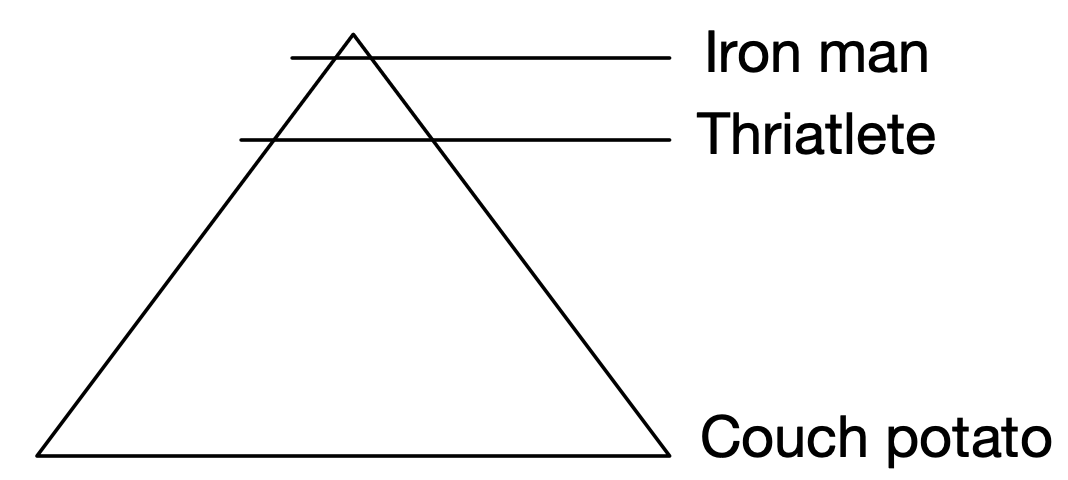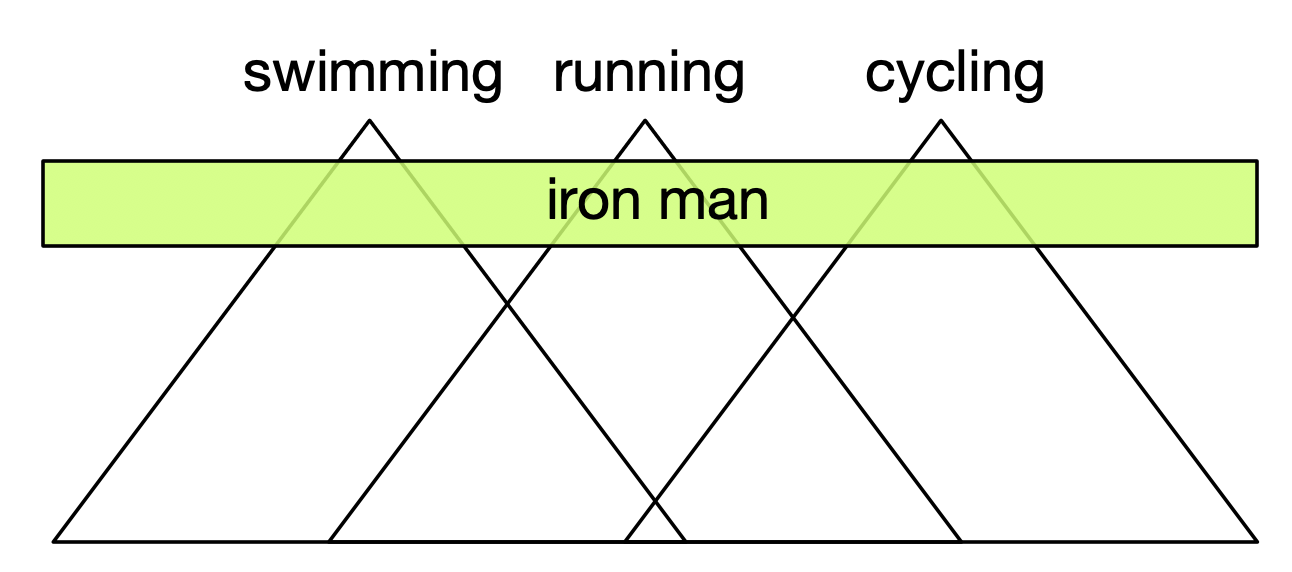The dominance hierarchy
The basic premise of any dominance hierarchy is that a minority of people is going to be fantastically successful and a very large number are going to stack up at the bottom (following a Pareto distribution). This doesn’t have to be an issue since there are thousands of dominance hierarchies to choose from and to become successful in.
Here’s an example I made in sports. Out of 300 million Americans, there’s only a 4mln representation that competes in triathlons every year. But merely 260.000 out of 200 countries globally make it to an Iron Man level.

This applies to business as well. Markets will also organise themselves in dominance / competence hierarchies. For every market leader, there will be a group of challengers, and dozens or hundreds of small alternatives that barely make it on the radar.
Dr. Jordan Peterson is a quite controversial speaker and writer but this short introduction to dominance hierarchies at Oxford University is well worth your time: the pursuit of value is structured in dominance hierarchies (youtube – 10 min)
actually all his classes are worth watching if you can handle the character 😉
The 5.000 hr rule
Gladwell’s 10.000 hour rule of work to become a success in something from his book Outliers is pretty well known, and equally protested but that’s for another post. It does form the foundation of my adjustment to it.
Looking back at our hierarchies of competence of before, it takes a lot of effort to become that triathlete, but at least double that effort again to become an Iron Man. So in the same amount of time/energy to become a 1%-er in one domain, you can become an expert in two. Hence my 5.000 hour rule 😉
“The goal is not to be better than the other man, but yourself.”
Dalai Lama XIV
When I find myself, both in private and business life, in a new domain (roles or verticals), I want to reach that level of expertise as fast as possible. The level I am looking for can be answered with the following question; do I master this domain enough to teach it to high school seniors?
Connections build ideas and innovation
Ideas, the physical ones, are basically braincells with past memories making new connections. The same applies to business ideas; by connecting existing concepts, one comes up with a brilliant new idea.
People who come up with faster ideas and solutions, make connections faster (yay for ADHD). People who make more ideas generally just have more memories available to connect to. Already having ADHD, it’s just a matter for me to add more of those memory braincells, hence the high school seniors question before I am ready to change to new domains.
The rise of the multi-domain expert
Here’s the thing; most disruptive innovations rise when different domains are brought together. That’s why we build diverse teams with different backgrounds. If you can build up a team however with people who are experts in multiple domains …

Let’s go back one last time to our triathletes example; Iron Men generally are not the masters (ie world champions) in swimming, running, and cycling. But it’s by becoming an expert in all three that they managed to dominate their hierarchy! Every hierarchy consists of sub-hierarchies and is part of other super-hierarchies. The more domains you master, the bigger the dominance hierarchy you will lead! This has been my personal inspiration to keep on diving in new territories of knowledge and skill.
Here’s a great video example of a girl who plays the viola AND sings at the same time at an incredible level, making here field of competition extremely small.
“Experience is overrated. Some people say they have twenty years, when in reality, they only have one year’s experience, repeated twenty times.”
Steven Covey in The Power of Something Stupid
One of the most inspirational books I’ve read about multi-domain innovation is The Medici Effect by Frans Johansson. If there’s one book on innovation you want to read before the end of the year (if you haven’t already) it’s this one. One of the concepts Frans Johansson lays out really well is that connecting multiple domains is not adding connections, it’s exponentially multiplying them! This excerpt of the book that makes this very clear is the story behind the success of Tubular Bells (yeah, the song!)
ADDENDUM (May 21st, 2019) : this article adds some scientific research as to why multi-domain experience trumps single domain expertise, even within that domain! https://www.theatlantic.com/magazine/archive/2019/06/how-to-predict-the-future/588040/
BookTip (Feb 2020): if you say “this is my life” then go reed “RANGE” by David Epstein. A great book on how and where generalists beat specialists.
Also read: the POLYMATH (Wikipedia)

[…] From 2021 to 2024 I’ve been quite fortunate to have gotten my first experiences into the MedTech world as the Business Unit Director and later CEO of a spinoff called Extra Horizon. People who know me, know that I thrive on learning the patterns across different markets. I’ve worked in data center infrastructure technology, chemical engineering analytics, maritime software, IoT platforms, enterprise blockchain, etc. Finding what’s unique to a specific domain can only be seen when you are alien to the domain itself and when you have seen enough different ones. (reading tip; the rise of the multi-domain experts). […]